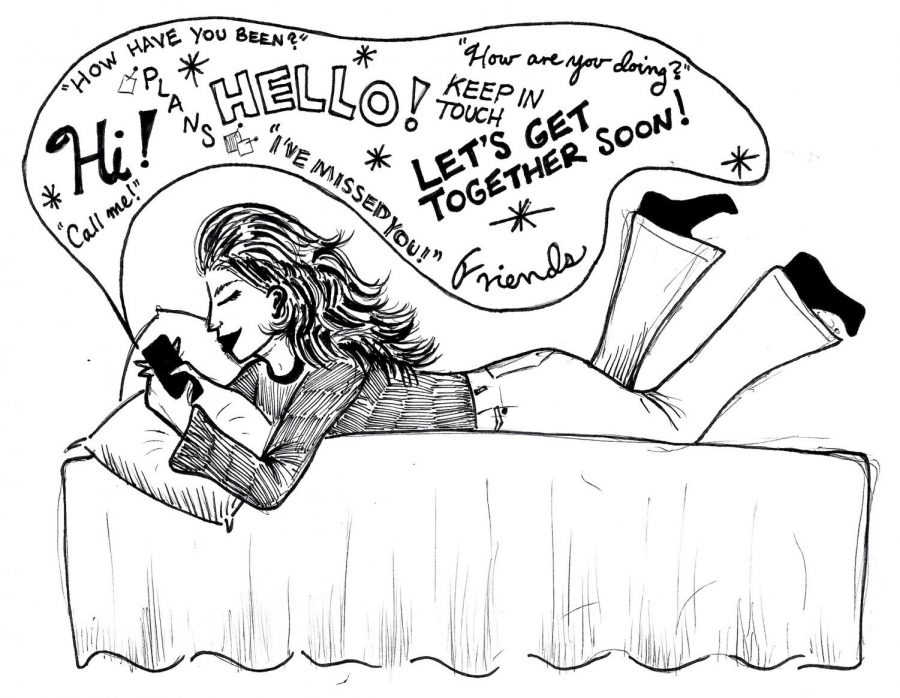How Quarantine Transformed My Relationships
3 Lessons I Learned While Socializing From Home
February 19, 2021
My daily life has been spent almost entirely at home since COVID-19 hit Washington state, with little in-person interaction aside from my immediate family members.
I had no problem with this when the first stay-at-home order was announced last March. I was super stressed from juggling school and work and thought a break from routine sounded nice. Plus, if it meant stopping the spread of a dangerous virus, I was more than willing to comply; but after a few weeks, the lack of socialization started to affect me more than I’d anticipated.
Self-isolation has been hard, but it’s also changed the way I look at my relationships. Here are three lessons I’ve learned about interpersonal relationships under quarantine.
1. Potential Connections Are Everywhere
I’ve never been much of a social butterfly — partly due to my natural introversion, and partly due to shyness and social anxiety. While self-isolating, though, I found that my need to interact with others overpowered any nervousness I faced when it came down to sending messages. I began reaching out to all kinds of people just to say hi, even if I didn’t know them well or I hadn’t been in contact with them recently.
I was surprised by the amount of conversations that started. I’m sure part of this was made easier by the fact that other people were also struggling with lack of social interaction, but that didn’t undermine an important realization: There were so many potential friendships that I hadn’t pursued because I was afraid of rejection.
I’d previously assumed that if someone wanted to connect with me they’d approach me, but that’s not always the case. Although not everyone struggles with social anxiety, many people still find it hard to approach others (this is especially true in Seattle.) When I put myself out there, I gained a greater — and closer — variety of friends than I imagined I would.
2. Losing Touch Doesn’t Mean You Can’t Get Back in Touch
When contact with friends fizzled out in the past, I’d generally assumed it was because they’d become disinterested — but when I reached out to the people I hadn’t been in touch with, I found that they were happy to catch up.
These interactions led me to look at the situation from my own perspective: I’m not the best at staying in touch with people either, and in many cases, I was just as guilty of falling out of touch with a person as they were. It was never deliberate on my part, so I couldn’t assume the same of others.
I realized that in general, people get busy with their own lives and it can be hard to stay in regular contact, but it’s not that they don’t want to talk to you. The nature of life is such that you’ll inevitably lose touch with others as you move forward, but that doesn’t mean a relationship is lost forever — sometimes you just need to put in a little effort.
3. Don’t Take Seeing People for Granted
The sudden onset of quarantine abruptly separated me from classmates and co-workers, and I came to the disappointing realization that I probably wasn’t going to see some of them again.
The pandemic resulted in a lot of “goodbyes” without closure, which made me realize how much I took my relationships and interactions with others for granted. When closure is given, you’re able to tell someone how you’ve appreciated their presence in your life — but since that won’t always happen, it’s important to show appreciation for people whenever you can.
Meeting up with people now only happens with a number of precautions in place, and I often go for long stretches of time without seeing anyone outside of my household. Being around people “normally,” let alone at all, was something that I didn’t even know I took for granted.
When the day comes where those precautions aren’t needed and get-togethers can be more frequent, I definitely won’t take it for granted anymore.
Lessons in Review
It’s almost been a year since COVID-19 prompted people to self-isolate. The lack of regular in-person interaction is still hard for me, but even so, I made a lot of new friends this year and grew closer to a bunch of people — even if our interactions happened via text instead of face-to-face.
Overall, I learned that effort and appreciation are what make relationships.
Relationships are a two-way street, so for them to work, both sides need to put in energy; but sometimes connecting with people won’t happen if you don’t take the initiative.
It’s important to value the connections you have because you never know how they might be affected in the future — and it’s always good to let someone know that you appreciate them, too.







